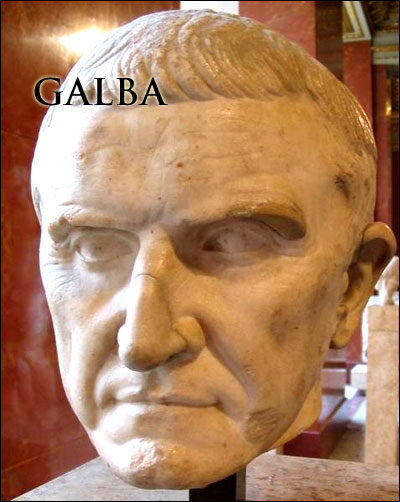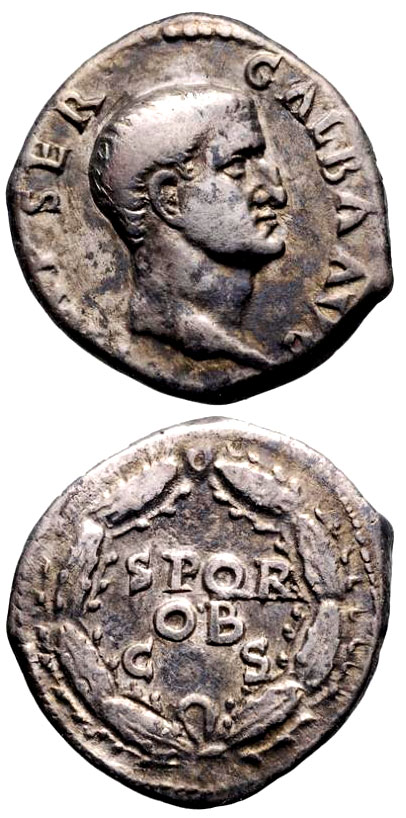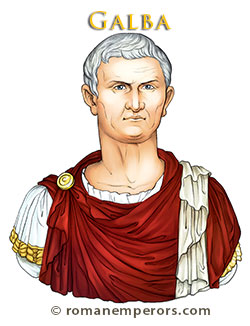Roman Emperor Galba
68 - 69 A.D.
Servius Sulpicius Galba
Busts, Statues, Coins, Information, Maps, Images, and More

Galba: A Seasoned Soldier Tested by Power
Servius Sulpicius Galba, who reigned as Roman emperor for a mere seven months in 69 AD, presents a complex and often contradictory figure. A seasoned military commander with a reputation for discipline and austerity, his brief reign exposed the challenges of navigating a fractious empire and the fickle loyalty of the Praetorian Guard.
A Life of Military Service
Born into a noble family around 3 BC, Galba embarked on a distinguished military career. He rose through the ranks, serving with distinction in campaigns across the empire, from Germany to Africa. His reputation for discipline and efficiency earned him respect from his troops and the Senate.
The Rise of a Reluctant Emperor
The year 68 AD marked a turning point in Roman history. Emperor Nero's reign descended into tyranny, culminating in his suicide. This event triggered a period of civil war known as the Year of the Four Emperors. Galba, stationed in Hispania Tarraconensis (modern-day Spain), emerged as a potential candidate for the throne.
Despite his reluctance, Galba was proclaimed emperor by his legions in January of 69 AD. He garnered support by promising a return to the principles of the Roman Republic and an end to Nero's excesses. His reputation for honesty and frugality appealed to the Senate, weary of corruption and extravagance.
A March on Rome and a Problematic Succession
Galba assembled his forces and marched towards Rome. Along the way, he secured the loyalty of Otho, governor of Lusitania (modern-day Portugal). By April 69 AD, Galba reached the capital and was declared emperor by the Senate.
However, Galba's reign quickly unraveled. He alienated the Praetorian Guard, accustomed to lavish bonuses from previous emperors, by refusing to offer the customary donative (payment upon a new emperor's accession). His frugal ways and perceived arrogance further eroded support.
Furthermore, his choice of successor proved disastrous. He bypassed experienced military commanders in favor of Lucius Piso Licinianus, a young and inexperienced noble. This move angered the army and disappointed many who desired a stable and capable leader.
A Betrayal and a Violent End
The discontentment reached a boiling point in January of 70 AD. Otho, realizing the opportunity, bribed the Praetorian Guard and conspired against Galba. In a swift and bloody coup, Galba and Piso were ambushed and murdered while on their way to a sacrifice. Their deaths marked the end of Galba's short-lived reign and ushered in a new phase of the civil war.
Legacy: A Reminder of the Fragile Nature of Power
Despite the brevity of his reign, Galba's story offers valuable insights into the complexities of Roman politics. He entered the power struggle with a reputation for integrity but struggled to navigate the treacherous landscape of ambition and loyalty. His downfall highlights the precarious nature of power in the Roman Empire, a system where even a seasoned military leader with noble intentions could be toppled by the whims of the army.
A Controversial Figure
Historians continue to debate Galba's legacy. Some portray him as a tragic figure – a reluctant emperor who failed to adapt to the harsh realities of Roman politics. Others paint him as an uninspiring leader whose rigidity and poor judgment ultimately led to his demise.
Regardless of the interpretation, Galba's reign serves as a reminder of the challenges faced by emperors during this turbulent period. His story underscores the importance of political acumen, effective leadership, and the fickle nature of loyalty in a power structure heavily reliant on the military.

More to Come

"Free of Vices"
When Nero had committed suicide in 68 AD the Julio Claudian line of emperors and the race of Caesar came to an inglorious end. The senate and the praetorians immediately proclaimed an old man named Servius Sulpicius Galba as Emperor of Rome. Galba was one of the most powerful men in Rome, the last member of a wealthy and influential family for over 300 years. According to Tacitus Galba was "free of vices rather than distinguished by virtues." After only a few months of ruling Rome he was considered too incompetent, and a man named Otho marched into Rome with legions from the Rhine River. Galba was murdered and Otho took his place.

















Latest




Popular




Useful




